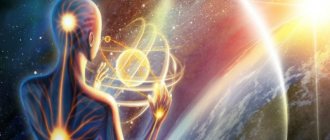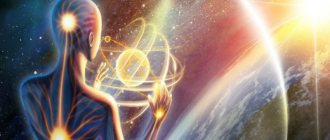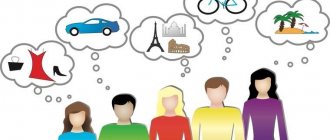A person performs many actions every day. They are based on the satisfaction of needs, that is, needs for something. Motives for activity may include the desire to feed oneself and loved ones, improve social status, acquire material wealth, or develop in a certain area. Let's find out what the needs are and how they differ.
Types of needs
In social science, it is customary to distinguish three types of needs: biological, social, spiritual. Let's briefly look at each type.
- A person's biological needs are related to the physical condition of his body. These include, for example, the need for food, sleep, and warmth.
- Social needs are related to what place a person occupies in society and how he realizes himself in work. This is a need for communication, caring for children, and career growth.
- The group of spiritual needs includes knowledge of the surrounding reality and oneself, enrichment of the inner world, familiarization with the values and ideals of society.
Rice. 1. Scheme “Human Needs”.
Application in marketing
In marketing, Maslow's pyramid serves as a starting point for finding target audiences and segmenting them, as well as for market analysis. Based on data received from users, specialists can find out what needs prevail among the target audience.
For example, the user cannot place an order for a long time - perhaps there are some fears - and the specialist needs to be told about the guarantees. Or show the valuable qualities of a product that will help improve its comfort: cooking equipment, an alarm system to protect the home, a Parker pen as an indicator of a person’s success and wealth.
Important! The pyramid is a material for reflection that will help you understand the big picture, but not solve a specific problem.
Thanks to the concept, it is possible to plan long-term goals in order to track the dynamics of changes in the needs of the audience and see them. That is, the company can predict demand, develop a strategy and assess risks. And for each segment, work out the corresponding product.
For example, a consumer is looking for a vacuum cleaner. It follows the classic customer journey:
- The first stage: “Manifestation of need.” It compares the characteristics and cost of the product.
- The second and third are “Interest” and “Research”. After the buyer has become familiar with the brand, he studies the warranty terms and delivery information.
- The fourth is “Purchase”. Purchase of goods.
- Fifth - “Return” or “Manifestation of need”. After the purchase, a person may discover a defect or breakdown - and either the company will solve this problem, or he will continue to search. At all stages, the buyer experiences different needs.
Biological needs
Man is a creation of nature. Therefore, the basis of its activity is the satisfaction of biological needs. In another way they are called physiological, natural, organic. They are given to us from birth. If ignored, the human body may stop functioning normally. Let's look at examples of such needs.
- In order for our body to fully develop, it needs a balanced diet. Wrong food choices can lead to various types of diseases (obesity, diabetes, musculoskeletal disorders).
- Equally important is the need for sleep. Each body has its own rate of rest. If the body does not rest fully, malfunctions in the functioning of the most important vital systems may begin.
- In order for the body not to undergo premature aging, people need to move. Sedentary work leads to poor posture, obesity, and joint diseases. To avoid this, you need to walk more often, do gymnastic exercises, and do exercises.
- The list of biological needs includes the need for clean water. It helps eliminate harmful substances and nourishes the body's cells. Excessive consumption of sweet carbonated drinks negatively affects the digestive system.
- The need to breathe is inherent in all people by nature. Clean air, saturated with oxygen, improves brain activity and improves the quality of life.
Rice. 2. Jogging.
What is the difference
The main difference between the concepts under consideration is that needs are unsatisfiable, and needs are satiable. This means that a person needs food, water, shelter throughout his life. This is what makes needs unsatisfiable.
In this case, needs, as a rule, can be satisfied once. If you purchase a specific product or receive a specific service, a person will stop feeling the need for it for a certain period of time or forever.
Expert opinion
Karnaukh Ekaterina Vladimirovna
Graduated from the National University of Shipbuilding, majoring in Enterprise Economics
Today, the issue of classifying human desires as needs or wants is considered very controversial. This also includes the desires of society, because, in fact, it is an integral part of human life. Moreover, a specific individual can live without society. Moreover, this will not lead to negative consequences. Similar nuances apply to love, the birth of children, and intimacy. For some people this may be a vital need, but for others it may be an ordinary need.
The concepts under consideration are given one of the central places in social science, philosophy, law and other sciences. This is due to the fact that they are key factors in human existence. The image and meaning of life, the goals and aspirations of a person, his attitude towards society and other people in it are based on them.
At the same time, it is extremely important to be aware of your own desires. It is important to identify the differences between the positive and negative sides and achieve what you want.
Relationship between biological needs and the needs of other species
What distinguishes humans from other living beings is the ability to take biological needs under control. For example, when experiencing hunger, people are able to wait for food; Needing sleep, a person gets home and goes to bed.
Without satisfying the body's needs, the needs of other groups are relegated to the background. For example, if a student has not eaten for a long time, he is unlikely to be able to learn the material studied in class.
Rice. 3. Schoolchildren in the classroom.
Ignoring the demands of the body has a negative impact on social needs: a hungry person can become aggressive in communication, violate norms of behavior, and perform poorly at work.
Each of us has something special
The need for self-realization refers to ideal needs. People who are unable to achieve something claim that if they got what they want, they would be at the peak of bliss. When a certain thing is in the zone of our imagination, everything is really like that. But, having become commonplace, the acquisition will lose its novelty.
When you achieve your goals step by step, you understand that, in essence, it is not the crossing points that are important, but the route itself. Most people go to work with more or less good wages. So what if the work is not pleasant? You can survive for a while. Only sooner or later patience comes to an end.
What have we learned?
Human needs, studied in grade 6, are divided into biological, social and spiritual. Biological ones include the need for breathing, movement, and food. Ignoring them leads to disruptions in the functioning of the body and affects other groups of needs.
Previous
Social studies Multinational culture of Russia briefly with examples of what it consists of (social studies 5th grade)
Next
Social scienceTypes of social norms - what they are, their characteristics, signs and examples in the table briefly
comparison table
The main features and differences of the concepts under consideration are given in the table:
| Criterion | Need | Need |
| Scope of terms | It is considered a fairly broad concept, and need is part of it. | On Maslow's pyramid of needs, only the bottom 2 steps are allocated for needs. |
| Significance | It represents goods without which human life is difficult, but possible. | It appears in the form of a primary object, which cannot be avoided. |
| Appearance | It is subjective in nature and appears in the human consciousness. | Differs in objective existence. The presence is due to human nature itself. |
| Relativity | They happen exclusively to people – creatures with highly organized consciousness. | They occur in any living creature - both people and animals. |
Concept and signs of need
Need represents the need for certain things, these can be objects of the material world, objects, people, social criteria. In their absence, the individual feels uncomfortable.
If we take into account this definition of need, then a need, in order to become a need, must meet several criteria:
- The presence of a shortage of an item of need, which causes dissatisfaction (need as a desired good);
- The presence of appropriate emotions (from negative emotions at the first stage to positive ones after the need is realized);
- Fixation on the subject of need, when consciousness can snatch from reality things that can satisfy a person (for example, when experiencing a feeling of hunger, an individual will focus on products and the smell of food).
Are you an expert in this subject area? We invite you to become the author of the Directory Working Conditions
The need system is created according to special rules. Need is inherent in all living beings on the planet, but the more developed the species, the higher the level of needs will be. The tree needs nutrients from the earth, sunlight, and watering from rain. Man, as a highly developed animal, requires much more.
The older the individual, the more extensive the list of his needs becomes. A child can completely do without things that an adult needs. Needs represent a strictly hierarchical structure (some are primary, others are secondary).
People's actions are caused by the existence of a certain need, which is the main motive for activity. The motivation to get what you want can move an individual forward, forcing him to take appropriate actions. Everything that man has created throughout history within the framework of politics, economics, art and science is considered the result of activity in the sphere of satisfying needs.
Everything is much more interesting
Ideal needs are more than just existing to feed oneself and provide shelter. Man has learned to profitably use the earth's resources. And, in essence, not much is needed to provide your body with energy and normal conditions.
When everything is in order materially, spiritual needs arise. Some people turn to the gods, while for others the shrine is the whole world around them. Devoting yourself to the love of this miracle is much more sublime and interesting than simply navigating the vicious circle of consumerism and depletion of vitality for the sake of deceptive, imposed goals.
Cultural needs are a craving for beauty and a desire to expand one’s own erudition. After all, a person’s wealth is not only in bank accounts, but also in his own head. The best investment is investing in yourself.
Every person naturally has certain talents. Their development also implies ideal needs. Examples: enrollment in creative clubs, learning languages. Such classes can be conducted for a specific purpose. But, in the end, having fun is also a pretty good reason. Time spent joyfully is well spent. The most important thing is to strive to find balance in everything. Including between spirituality and the material world.
Marketing management 10th ed. — Needs, requirements and demand
Previous part: “Marketing concepts and tools (continued)”
Active market participants and prospective clients
An active market subject (seller) is one who is waiting for an answer, response (service, purchases, votes, subsidies) from the other party or potential client. If two parties are trying to sell something to each other, we call them both active market subjects.
Needs, demands and demand
An active market subject vitally needs information about the needs, demands and demands of the target market. Human needs - a sense of urgency to meet basic needs. People need food, clothing, a sense of security, a sense of belonging to a group, and respect. In addition, we all urgently need rest, education and entertainment. But the American food need takes the form of a need for a hamburger, fries and a soft drink. On the other hand, the need for food can be satisfied by another set of them. A hungry Mauritian will most likely prefer mangoes, rice, beans and lentils. Human needs are formed and modified under the influence of social forces.
Demand is the need for certain goods, expressed not so much in desire as in the ability to purchase them. Many people want to buy a Mercedes car, but few have at their disposal the amount of money necessary to fulfill such a desire. Thus, the manufacturing company must take into account not only the number of individuals who need its goods, but also, more importantly, which of them will want to purchase them and will be able to satisfy this need.
Advertising on the website
Advertising on the website
This distinction sheds light on common criticisms such as “Manufacturers create needs” or “Manufacturers force people to buy things they don’t need.” Manufacturers do not create needs. Needs exist before suppliers exist. Manufacturing companies and other social forces and institutions influence human needs. The manufacturer may be promoting the idea that the Mercedes brand will satisfy the individual’s need for increased social status. But it is not he who creates the need for a high social position. Manufacturers influence demand by offering goods that are necessary, attractive, desirable and accessible to consumers.
Products and offers
Products satisfy human needs. A product is anything that can be offered to satisfy human wants and needs. In the future, we will use the term offer as a synonym for goods. A product, or offering, can be presented as a tangible product(s), service(s) or idea(s).
Advertising on the website
A brand is essentially an offering from a familiar source. For example, McDonald's advertising evokes a lot of associations in the minds of consumers (burgers, entertainment, children, fast service, Golden Arches), which form the image of the brand. All companies strive to have strong brands (that is, to create a lasting, favorable image of their products).
Customer Value and Satisfaction
A supplier's product or offering will only be successful if it provides value and satisfaction to the target customer. The buyer, relying on his perception, will choose from competing offers (products) the one that, from his point of view, has the greatest value. We define value as the relationship between what a consumer receives and what he gives. By purchasing a product, the consumer receives certain benefits and assumes certain costs. Consumer benefits are divided into functional and emotional, and costs include monetary, time, energy and material costs. Thus, the value of a product is defined as:
Value = Benefits/Costs = (Functional benefits + Emotional benefits) / (Monetary costs + time costs + energy costs + material costs)
The manufacturer has the opportunity to add value to the customer in several ways.
· Increase consumer benefits. · Reduce buyer costs. · Achieve increased benefits and reduced costs. · Provide a proportionate increase in benefits relative to the increase in costs. · Achieve a proportionately smaller reduction in benefits compared to cost reduction.
A buyer who is faced with a choice between offers with values V1 and V2, first of all, considers the ratio V1/V2. It is most likely that if the ratio is greater than one, the consumer will prefer V1; if the ratio is less than one, he will prefer V2; and it will be difficult for the buyer to decide if the ratio is equal to one.
Continuation: “Exchange and Transactions”
Buy the book
Open your soul
Most people are in their vacuum for only a short time. After the wounds from the last fall are healed, there is a natural desire to take flight again. In order to protect yourself from moral wounds, you need to learn to organically combine the world of emotions and pure reason.
They don't teach us this at school. There are books on these topics, but they are opened only by those who themselves have realized the need for this, have felt that a full life implies the satisfaction of ideal needs. You need to learn to get pleasure from both delicious food and a sincere conversation, both from a comfortable sofa and from an interesting book. Banal consumerism eventually gets boring, and a desire appears to touch something divine.
In addition, a person himself can become closer to the Almighty in the process of creation. By creating interesting projects, works of art, organizing events, making the world around us a better place, we ourselves blossom before our eyes, reaping the beneficial fruits of our own activities. You just need to open your heart and soul, stepping towards everything new.
The Importance of Intangible Aspects of Life
An example can be the culture of the East, in which spiritual needs are placed no lower than physical ones. It is wrong to say: “Man has a soul.” In fact, it is the spirit that has a body, which it acquires at the next stage of its path.
Self-awareness is formed in childhood. Many children are taught to wash themselves, clean their room, and do well in school, but they miss one important nuance. The younger generation is not given the ability to understand their own emotions. Sometimes it even happens that teenagers get lost in their feelings and don’t know how to perceive themselves or the world in a given situation. They are said to be “quiet children.”
But, as a rule, such individuals experience their infantile period much later, when adult, meaningful behavior is already expected of them. And all because they were not explained how to realize their ideal needs.











